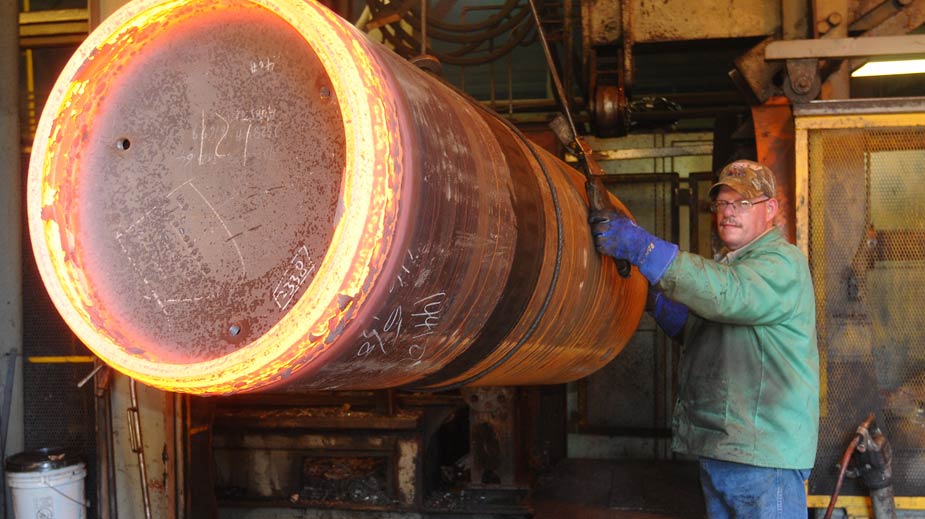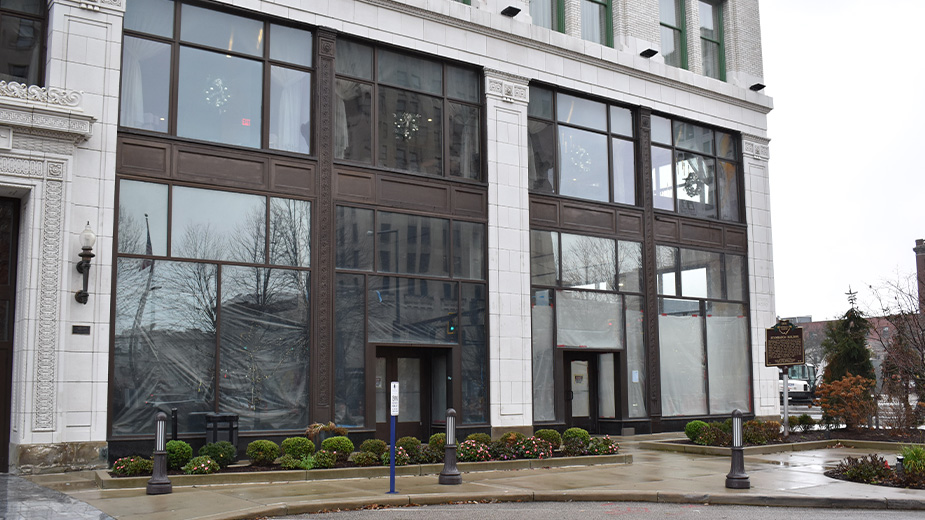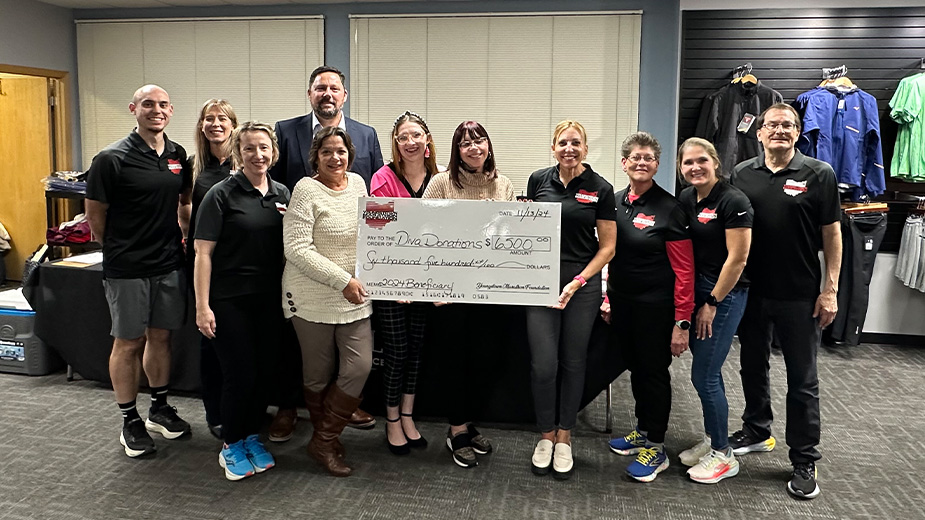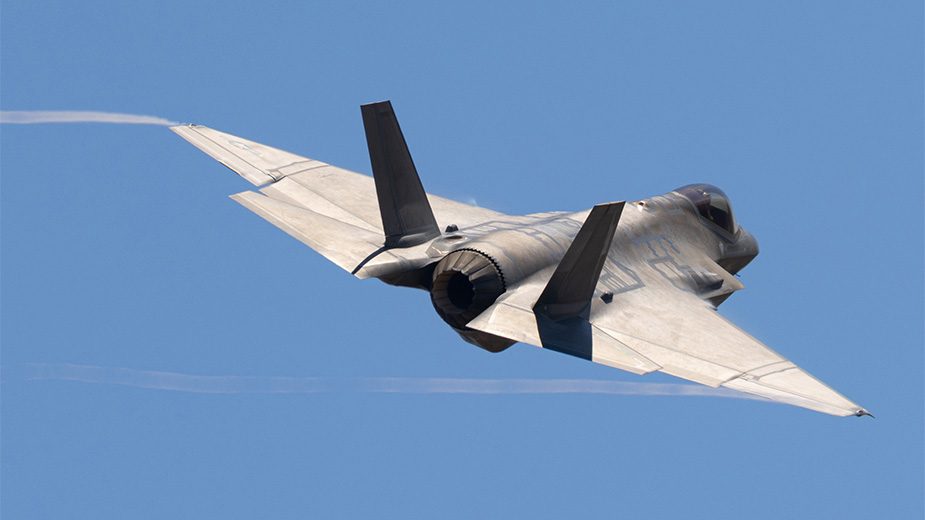‘Made in USA’ Supports Columbiana County Industry
COLUMBIANA, Ohio — Matt Skillman concedes it isn’t easy staying true to his dedication to manufacture a product strictly “Made in the U.S.A.”
“It’s not exactly the cheapest option,” he says as he stands next to one of his latest creations, a customized Youngstown State University metal fire pit. “But, we’re committed to being an American-made company.”
To Skillman, “Made in the U.S.A.” means more than merely assembling a component or product in this country and then shipping it elsewhere. Instead, the owner and president of Ohio Flame in the city of Columbiana emphasizes that the steel manufactured in his pits is sourced from domestic mills, the screen covers supplied the company are also American-made, and accessories such as fire pokers and tongs are forged in Ohio.
“It can be difficult,” Skillman says of manufacturing a 100% made and sourced American product. “There’s a lot of foreign steel on the market.”
The vast majority of the company’s fire pits are sold in markets other than northeastern Ohio, Skillman says. “We ship all over. The West Coast seems to be popular for us,” he says.
Less than 5% of Ohio Flame’s business is local, he notes.
Skillman’s production methods are proprietary, he says, but he uses tried-and-true industrial crafts such as welding and plasma cutting to create original designs and artisan pieces.
The business operates in space at Compco Industries’ plant at 400 Railroad St. – where Skillman used to work full-time. Compco supplies the metal bowls that Ohio Flame uses to manufacture its product.
“I started doing this out of my garage in 2009 as a side business,” Skillman says, “and then moved here so I could accommodate trucks and shipping.” Soon, he discovered a growing market for outdoor living goods and pondered whether to take his idea to the next level and full-time production. “Some businessmen and Compco gave me the opportunity to take the leap,” he says. “They gave me the help that I needed.”
Skillman’s fire pits range in price from $274 to $1,800, depending on the size and custom order. “All of these have a lifetime warranty and include free shipping,” he says.
The emphasis on American-made products has reinvigorated other manufacturers in Columbiana County. There’s perhaps no better example of this than American Mug and Stein Co., one of the last two potteries operating in East Liverpool and a company on the verge of shutting its doors five years ago.
We were going to go under,” recalls Clyde McClellan, owner of American Mug. Then, McClellan took a call from Ulrich Honighausen, owner of California-based Hausenware, which supplies retailers with tableware products. It turned out that one of his customers, Starbucks, was looking for a U.S.-based pottery to manufacture products for its new American-made retail line of coffee mugs – and American Mug and Stein appeared on his radar screen.“It saved my business,” McClellan says.
Indeed, business has nearly quadrupled since American Mug began its relationship with Starbucks four years ago, the pottery owner says. “It’s the first time in 12 to 15 years that we have more business than capacity,” he says. “And, we’re becoming more efficient.”
That’s important because Starbucks is a very demanding customer, McClellan notes, adding that the company’s production methods haven’t changed much in 90 years.
“Our mugs are cast the old-fashioned way, not by machines,” he says.
American Mug employs 17 and turns out 12,000 mugs a month. Now, the company is working to improve its lead times to adjust its tooling and shelf space for new products.
“I’d say 99% of our new business is because of our association with Starbucks,” McClellan says, noting that the stamp of approval from the largest coffee retailer in the country has led to other customers through major online retailers such as Amazon. “If you get good ratings, there’s a direct correlation between reviews and sales. We just finished a couple of big orders for California,” he says. “It’s been unbelievable.”
Manufacturers across Columbiana County have enjoyed a widespread resurgence since the Great Recession ended. As of last year, there were 171 companies classified as manufacturers operating in the county and the manufacturing sector accounted for 14% of employment in the county, according to the Ohio Manufacturers’ Association.
As of last January, there were 6,019 employed by Columbiana County manufacturers, according to data provided by the U.S. Department of Labor’s Bureau of Labor Statistics. By contrast, employment in the manufacturing sector hit a 10-year low in June 2009, when just 4,865 held jobs in manufacturing, according to the BLS.
Still, Columbiana County has yet to see manufacturing employment match the pre-Great Recession levels of January 2008, when 6,600 were employed in the sector, data show.
“I’d say things are steady right now in the industrial sector,” observes Mike Mancuso, executive director at the Sustainable Opportunity Development Center in Salem, a nonprofit development agency that works with local, county, state and federal governments to encourage local business growth.
Several manufacturers in the Salem area – Mancuso is reluctant to identify them – are contemplating expansions but taking a “wait and see” approach to see who’s elected president before making a final decision. “I’m seeing that all across the country, not just here,” he says.
He reports one manufacturer that ships internationally is in the midst of relocating some of its foreign production operations back to Columbiana County, while others in the sector are looking to hire more workers as their businesses grow. “Hopefully, we’ll see some investment after the election,” he says. “Right now, it’s more positive than negative.”
There were enough positive indicators in the economy to encourage SMS Technical Services LLC in East Palestine to expand its plant there, says plant manager Ken Heestand. “We had a pretty good year,” he reports. “We put on an 8,000-square-foot addition with crane capacity.”
The company designs, manufactures and reconditions large equipment used in rolling mills, Heestand says. Despite the overall slowdown in the steel industry, SMS has experienced steady orders from its clients across the country. “We serve the steel industry,” he says.
While reconditioning older equipment holds steady of the business, new manufacturing orders are also robust.
“Most of the mills are keeping steady with long-term capital projects,” Heestand observes, even in the face of lower steel prices. “In previous years, they would stop work on capital projects, but that didn’t happen this time.”
Another manufacturer that has designs on expansion is Columbiana Boiler Co., Columbiana. Within two years, the company hopes to complete the construction of a new building on land it owns along Railroad Street, says its CEO, Michael Sherwin. “Business is good for us,” he relates. “We’re busy on both sides of the container business.”
Columbiana Boiler, founded in 1894, manufactures specialized containers used to transport chemicals – sold mostly in the international market – and large steel galvanizing kettles used in the metals industry, Sherwin says.
“We’re looking at a $3.5-million expansion on the building to add more floor space,” he reports. The company employs 45, and the expansion would accommodate production of large galvanizing kettles, some of which weigh 100 tons.
As for the elections in November, Sherwin says that both major presidential candidates – Hillary Clinton and Donald Trump – are placing an emphasis on infrastructure spending, which would help his company’s galvanizing kettle business.
Meanwhile, international demand for the company’s chemical cylinders is on the increase.
“We’re booked out for a full year,” Sherwin says, noting roughly 60% of his company’s cylinder business is exported. “We just finished an order for Venezuela,” he says.
Pictured: Jeff Himes puts the finishing touches on a container at Columbiana Boiler Co.
Copyright 2024 The Business Journal, Youngstown, Ohio.



